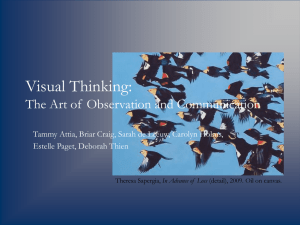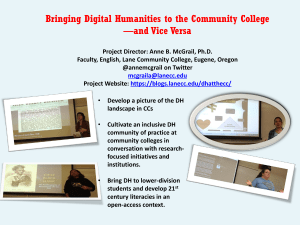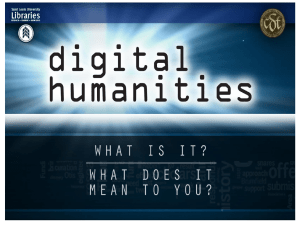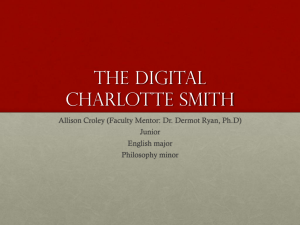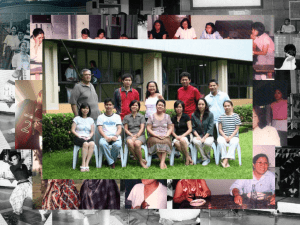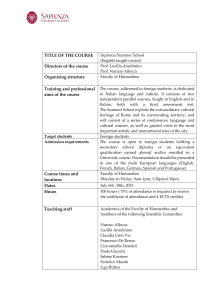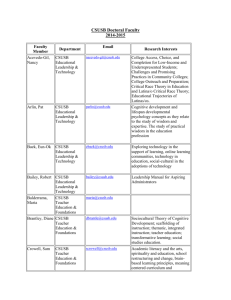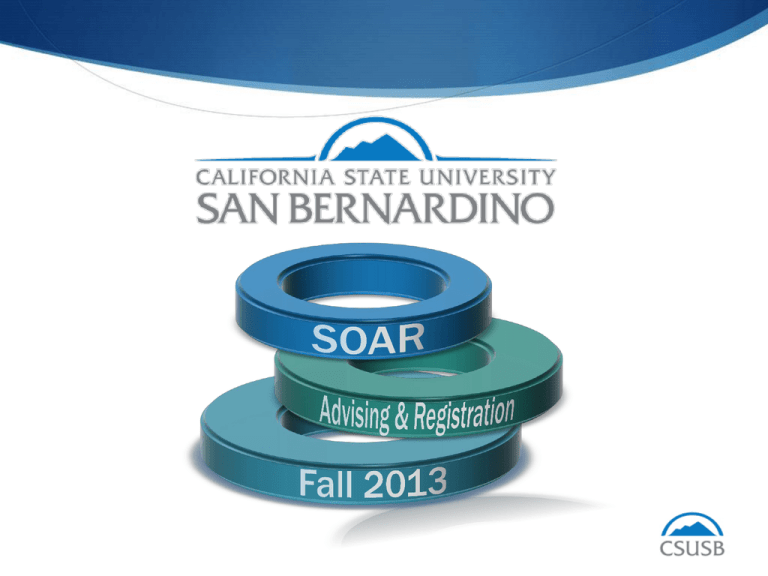
What’s in this Presentation
•
•
•
•
•
•
•
•
•
•
Community College vs University
Necessary Tools for Academic Choices
CSUSB’s Bachelor Degree
CSUSB’s Course Numbering System
General Education (GE) & Upper Division
Units & Unit Load
Major Courses
PAWS
Registration, MyCoyote
Advising & Academic Services
CSUSB -vs- Community College
• Academic Advising is done by the department of your major
• CSUSB is on a Quarter system which is 10 weeks short
• In order to drop courses after Census, students must petition
with documentation
• You are responsible for dropping your own courses
• Plus (+) & Minus (-) grading
Necessary Tools for CSUSB
• 2012-2014 Bulletin of Courses – University
Policies, services, majors, minors, academic
programs, credentials, graduate programs, faculty,
staff
• Class Schedule – Course offerings, important dates,
fees, department listing, procedures, services
• PAWS (Program Advising Work Sheet) – Your
academic progress report
CSUSB Bachelor’s Degree
*Other CSU & State Requirements
See End Portion of PAWS
CSUSB Course Numbering
• 001 to 099 = Non-degree applicable
• 100 to 299 = Lower division
• 300 to 599 = Upper-division
• 600 to 699 = Graduate
Bulletin
• General Education
Requirements
• Policies
• Procedures
• Undergraduate degrees
• Graduate degrees
GENERAL EDUCATION
• The majority of community college students
transferring into CSUSB have been certified or
completed all Lower Division GE requirements
• We will focus on the Upper Division GE
Requirements
Upper Division
GE Requirements
• There are 5 Upper Division GE Requirements
– 3 Integrative Capstones
– 1 Upper Division Writing
– 1 Multicultural/Gender
• PLEASE NOTE: Liberal Studies majors follow a different
curriculum. Please consult with the Liberal Studies
Department
Category B: Natural Sciences
5)
INTEGRATIVE CAPSTONE NATURAL SCIENCE – 4 UNITS –
Choose one course (must have completed 90 quarter units)
•
•
•
•
•
•
•
•
NATURAL SCIENCE 300 – Science & Technology
NATURAL SCIENCE 310 – The Environment and Human Survival
NATURAL SCIENCE 314 – Life in the Cosmos
NATURAL SCIENCE 315 – Natural Disasters
NATURAL SCIENCE 320 - Energy
NATURAL SCIENCE 325 – Perspectives on Gender**
NATURAL SCIENCE 351 – Health and Human Ecology
NATURAL SCIENCE 360 – Legacy of Life
** Also counts in Category G
Category C: Humanities
5) INTEGRATIVE CAPSTONE HUMANITIES 4 UNITS- Choose one course (must
have completed 90 quarter units)
•
•
•
•
•
•
•
•
•
•
•
•
HUMANITIES 319 – Myth, Metaphor and Symbol
HUMANITIES 325 – Perspectives on Gender **
HUMANITIES 328 - Asian Cultural Traditions **
HUMANITIES 330 – Arts and Ideas
HUMANITIES 335 – The Origin and Contemporary Role of Latino Culture**
HUMANITIES 340 – Interpretation and Values
HUMANITIES 344 – Ideas in American Culture
HUMANITIES 350 – The Cultures of American Childhood**
HUMANITIES 370 – African Heritage in the Arts**
HUMANITIES 375 – The World of Islam**
HUMANITIES 380 – Comparative Studies in the Arts: East & West**
HUMANITIES 385 – A Cultural History of Fashion
**Also counts in Category G
Category D: Social & Behavioral
Sciences
5)
INTEGRATIVE SOCIAL SCIENCE CAPSTONE – 4 UNITS –
Choose one course (must have completed 90 quarter units)
•
•
•
SOCIAL SCIENCE 300 – Nonwestern World
SOCIAL SCIENCE 304 – Contemporary Latin America
SOCIAL SCIENCE 315 – Cultural Adaptation: The Quest for
Survival
SOCIAL SCIENCE 316 – Race and Racism**
SOCIAL SCIENCE 320 – Understanding Capitalism
SOCIAL SCIENCE 321 – Urbanization and the Urban Environment
SOCIAL SCIENCE 325 – Perspectives on Gender**
SOCIAL SCIENCE 345 – Religious Expression in America
SOCIAL SCIENCE 350 – Roots of Modern Racism in America**
•
•
•
•
•
•
**Also counts in Category G
Category F: Upper Division
Writing
This requirement may be completed through one of the following two options:
1) EXPOSITORY WRITING COURSE– 4 UNITS– Choose one course:
• EDUCATION 306 – Expository Writing for Education
• ENGLISH 306 – Expository Writing
• HUMANITIES 306 – Expository Writing for the Humanities
• MANAGEMENT 306 – Expository Writing for Administration
• NATURAL SCIENCE 306 – Expository Writing for the Natural Sciences
• SOCIAL SCIENCE 306 – Expository Writing for the Social Sciences
2) PASSING A PROFIENCY EXAMINATION – 0 UNITS
• You may contact the Testing Office at 909.537.5045 for more details regarding
the examination
Category G: Multicultural/Gender
Can be met by a course in another category, which is then also counted in Category G.
These double-counted courses are listed under option one:
OPTION ONE: Select a course from capstone area followed by an asterisk
•
HUMANITIES 325 – Perspectives on Gender
•
HUMANITIES 328 – Asian Cultural Traditions
•
HUMANITIES 335 – The Origin & Contemporary Role of Latino Culture
•
HUMANITES 350 – The Cultures of American Childhood
•
HUMANITIES 370 – African Heritage in the Arts
•
HUMANITIES 375 – World of Islam
•
HUMANITIES 380 – Comparative Studies in the Art: East & West (fall 2001)
•
NATURAL SCIENCE 325 – Perspectives on Gender
•
SOCIAL SCIENCE 316 – Race and Racism
•
SOCIAL SCIENCE 325 – Perspectives on Gender
•
SOCIAL SCIENCE 350 – Roots of Modern Racism in America
OPTION TWO: Select a course from the following:
•
ANTHROPOLOGY 325 – Human Variation & the Concept of Race
•
ANTHROPOLOGY 333 – Sex & Gender in Cross-Cultural Perspective
•
OMMUNICATION 304 – Intercultural Communication
•
COMMUNICATION 401 – Gender, Race and Media
•
CRIMINAL JUSTICE 451 – Women and Crime
•
ECONOMICS 352 – Political Economy of Poverty and Discrimination
•
ENGLISH 314 – American Indian Literature
•
HUMANITIES 460 – Cultural Studies
•
MUSIC 308 – Women in Music
•
MUSIC 350 – Music of World Cultures
•
PHILOSOPHY 364 – Philosophy of Race and Ethnicity
•
PHILOSOPHY 367 – Philosophy and Sexual Politics
•
PUBLIC ADMINISTRATION 305 – Organizations in Multicultural & Diverse Societies
•
THEATRE ARTS 462 – African-American Theatre and Drama
•
THEATRE ARTS 463 – Asian Theatre
Semester vs Quarter Units
Multiply your semester units by
1.5. This will equal your quarter
units
(Ex. 4 sem units x 1.5 = 6 qtr units)
How many units should I take?
• There is no single right answer for all students.
– Most students find that 12 -16 units is reasonable
• Most classes are 4 units. Your advisor can guide
you
• Students who work more than 20 hours per should
consider a 12-unit schedule
• There is a 17 unit cap (Seniors 19.5 after priority)
Major Courses
• Discuss your major course choices with your
department faculty advisor
• Review the department course road map if one
is available on their web site
• Review the Bulletin of Courses and examine
the requirements under your major
• ALWAYS CHECK YOUR PAWS
Checking Your Progress
• Always check your CSUSB Email for university updates,
instructor messages, and registration information.
• You should check your progress periodically throughout your
academic career
• Do this through your PAWS
• PAWS is an online degree progress check
• Check your progress on GE requirements, major
requirements and units earned
• Access through MyCoyote
What’s Next?
• You should now have a better understanding of your
General Education requirements and how to choose your
classes for the upcoming quarter.
• Next, you should receive advisement from the department
of your major.
• Once you know what courses to take, you are now ready
to register for courses through MyCoyote. Look for your
appointment day and time.
Possible Holds
•
•
•
•
•
SOAR
EPT (English Placement Test)
ELM (Entry Level Math)
MMR Grace Period
Department Advising
MyCOYOTE
July
th
15
Services to Students With Disabilities
• Offers a comprehensive and well-coordinated
system of educational support services to
students who have documented permanent or
temporary disabilities.
• Call 909.537.5238
• Located in UH-183
Advising & Academic Services
• Contact Information
• University Hall 380
• 909.537.5034
• www.ugs.csusb.edu/Advising/
• Academic Probation
Counseling
• Undeclared Advising
• Basic Skills & Remediation
• SOAR
• University Petitions- Leave of
Absence, etc.
• Excessive Unit (Senior) Advising
• First-Year Seminar
• Student Success Advisors
CSUSB Askadvisor
Welcome to Cal State
San Bernardino!
We are proud to have you as part
of the Coyote family!

